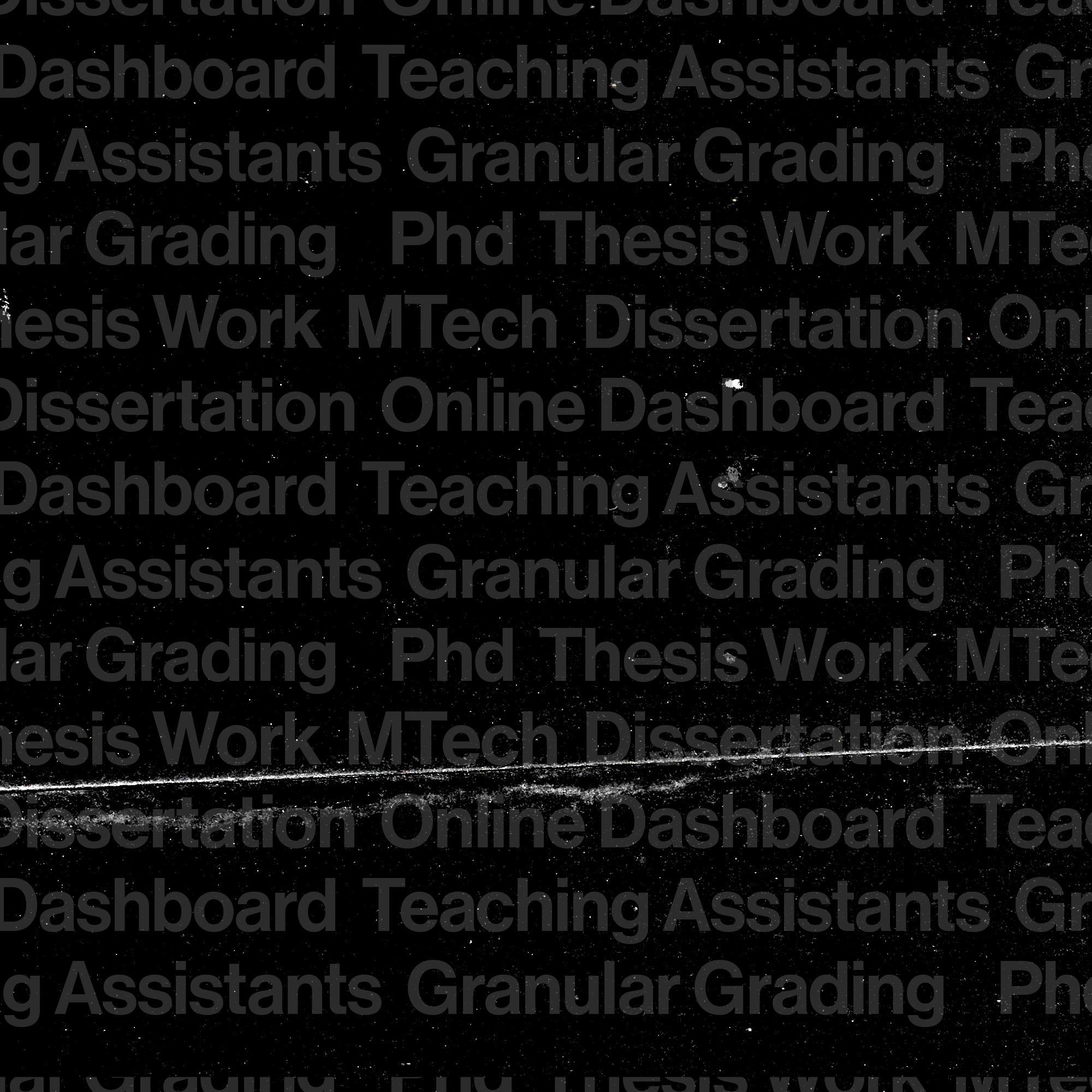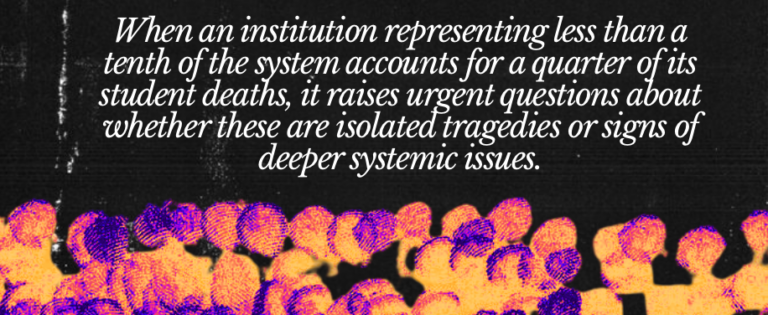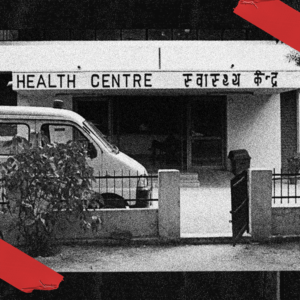Disclaimer: The following article’s content is comprised of excerpts quoted from the current Post-graduate Academic Review Committee (PGARC) Report, 2020-21. As per a note mentioned within the report, all recommendations and data used have been for pre-pandemic conditions, and the effect or considerations arising out of the pandemic are beyond the scope of the present report.
The first academic review of the PG Programme (PGP) was presented to the Academic Senate in December 2012 amid growing emphasis in the Institute on the centrality of the PGP. The latest review is thus the Second PG Academic Review. The report was prepared by a panel of members that included: Prof. Amitabha Bandopadhyay, Prof. Nisheeth Srivastava, Prof. Nisant N. Nair, Prof. Parasar Mohanty, Prof. Prashant Bagad, Prof. Sameer Khandekar, Prof. Sarani Saha, Prof. Sri Vanamalla V., Mr Vineeth Vijayan (Student Representative), and Prof. Yashowanta N. Mohapatra (Chair).
For this article, we have mentioned a few impactful introductions, set out as recommendations or suggestions in the report, made by this committee with an aim to make PGP more student-friendly and meticulous, like most elite and recognized higher education programmes across the globe.
Proposal to set-up PGFC
A PG student typically comes from a different academic set-up and is often left bewildered by the organizational structure and flow of decisions and the stress of academic rigour. Discontent among students has been noted that has led to the propagation of a perception that the system is unresponsive towards problems of PG students. This shall become more acute as the Institute aims to considerably increase the size of PGP, which currently stands at approximately 40 per cent of the total strength.
To resolve this issue, PGARC recommends setting up a Post-graduate Facilitation Centre (PGFC). The Centre shall be headed by an experienced faculty member or an eminent educationist and aided by a team consisting of one designated DPGC member from each Department and a PG representative of the Student’s Senate. The basic functions of PGFC will broadly include the following:
i) Arranging professional support required by groups of students in improving language skills outside the formal course structure, communication skills in navigating careers, software and data analysis skills, and so on.
ii) Coordinating outreach efforts of Departments to project PGP in digital media space (interviews with faculty and students, short films, etc.), social media, organizing events celebrating student experience through achievements in publishing papers, attending conferences, or innovative projects of a similar kind, maintaining helpdesks manned by students (as a part of their TA work) to direct students seeking help, and providing support to international students in consultation with International Relations Cell.
Addressing Coursework Inadequacies
It has been observed that Departments/IDPs are struggling to be able to offer enough courses to the satisfaction of students, especially for Master’s Programmes. Sometimes even compulsory courses are being joggled around in semesters due to the lack of a critical number of faculty in the Programme or Stream. This is a serious academic concern, and the need for interdisciplinary courses (compulsory or electives IDC/IDE) designed especially for PG students across Departments have been voiced. PGARC supports the introduction of interdisciplinary courses. It encourages all Departments/IDPs to participate in at least one IDC annually, especially those that are offering different versions for similar content.
A need for a Centre of Interdisciplinary Studies which spearheads the design and development of such courses is an issue that the Departments can discuss and then address accordingly. It has also been suggested to Departments that supervisors should allow students in engineering and science a course in HSS at an appropriate level as an AE if the candidate wishes so (keeping in view constraints of workload and progress). However, this course may be allowed only after the concerned student has passed the Comprehensive Examination successfully.
With the fast-changing pace of knowledge boundaries, the doctoral programme, in which a student spends more than four years, must have the opportunity to continue formal learning even after all course requirements are over. Such opportunities can be made available to interested students through a 4-week long, 3-credit course capsule consisting of 12 lectures and 2 hours of testing or equivalent evaluation. The Special Topic Course Capsule (STCC) can be offered by a visiting professor, a special invitee, or a faculty member.
Further, recommendations to Senate for considering adoption on the Institute level have been stated as well. These include:
i) Introduction of a zero-credit PG Seminar Course (at least for one semester for M.Tech. and two semesters for PhD students) in which PG students attend seminars given by students under the mentorship of a faculty. This shall increase the breadth of knowledge and awareness of current trends in the discipline while improving communication skills.
ii) The Department is advised to offer their doctoral students a course covering topical issues relevant to the profession and the disciplinary community, along with communication skills in writing and oral presentation. The communication skills module may be offered at the Institute level, and the introduction to profession module should be offered by the Department.
Academic Performance: Inadequacy and Programme Termination Procedures
The purely CPI-based criteria for identifying performance deficiency and termination has in large measure, resulted in structural ‘grade inflation’ across PGPs, instead of ensuring minimum quality standards in supposedly elite Programmes. In light of this, PGARC makes two recommendations:
i) Introduction of granular grading: A+ (10/Outstanding); A (10/Excellent); B+ (09/B Plus); B (08/Good); C+ (07/C Plus); C (06/Fair); D+ (05/D Plus); D (04/Pass); E (02/Exposure); F (00/Fail); S: Satisfactory; X:Unsatisfactory; I: Incomplete (for internal usage before converting it to a valid letter grade on completion of evaluation components by the stipulated last date for submission of grades in a semester. (As per an email circulated before the beginning of the new semester, the granular grading system has been enforced on an institute level since 2022-23/I).
ii) The current minimum CPI criteria should be reduced to 6.5 for PhD Programmes, and 6.0 for Masters Programme. The revision of minimum CPI criteria should not be seen as a downgrading of standards but rather recalibration to protect the meaning of the standards the Institute seeks to adopt.
Regarding the termination procedure, it has been recommended that the list of deficient students can be allowed to reply to a show-cause notice from the Convener, DPGC, after authorization from SPGC on the basis of the APEC report. SPGC be authorized to decide on a case-by-case basis considering the written and clearly argued recommendations of DPGC and Counselling Services. Only the Termination cases at that stage are brought to the Senate for consideration of mercy appeals.
Milestones in Thesis Work
PGARC makes the following set of recommendations to improve the quality of PhD thesis and reduce the time taken to complete the degree:
i) Open Seminar in 9th Semester (OS9S): this dictum or mantra should dictate all administrative policies, decision-making, and academic judgement at all levels. There are Departments in which currently the allotment of thesis supervisor is carried out after the Comprehensive Examination or the coursework is longer than three semesters. These Departments/IDPs need to critically review their doctoral programmes in the meantime so as to align with the policy of OS9S.
ii) The Doctoral Monitoring Committee (DMC) is now a mandated feature by the Senate. PGARC recommends that a DMC review meeting for a student need not be held at the end of the semester but at any time during it, with a constant gap between them in subsequent semesters. This would evenly distribute DMC meetings in a Department throughout the semester. The award of grades of thesis work remains the responsibility of the Thesis Supervisor as per the extant PG rules.
iii) PGARC suggests that the Thesis Supervisor prepares the student for Comprehensive Exam Viva through several simulated sessions for them to understand the nature of the examination and expectations. Also, the Comprehensive Boards should provide a narrower pre-specified domain for preparation in view of the student’s coursework and foundations required for later work and career.
iv) Introducing Thesis Work Plan: PGARC recommends that the student presents Version-1 of their broad work plan as a short document specifying the Thesis Work Plan (TWP) to the DMC within four months of finishing SOTA. The nature and style of the TWP is to be decided jointly by the Thesis Supervisor and the student. Keeping in view the work packages within the TWC, the period (between SOTA and Open) can be roughly divided into four achievement milestones (which can be changed as one progresses) which, when completed, will allow the student to deliver their Open Seminar.
v) PGARC recommends that an online ‘PhD Student Status Dashboard’ be maintained for each student. This should contain essential information about PG Manual mandated milestones, due dates, completed dates, and achievements in Tabular form.
vi) PhD exit options: M.Tech./MA/MS/MSR degree is proposed as the exit degree for PhD in all disciplines. A PhD student can opt for the exit option at any point of time in his/her PhD tenure after completing the required coursework. MTech/MA/MS/MSR thesis/project guide will be assigned by the DPGC Convener. A student failing in the comprehensive examination for two consecutive times may, on the recommendation of DPGC, shift to the exit track of the M.Tech./MA/MS/MSR programme. All PhD students in the exit track of a Master’s Programme be permitted, with the consent of the DPGC Convener, to participate in SPO placements any time after their fourth semester in the PhD programme.
There is a need for stricter control at all stages of the Master’s Thesis work, starting from articulating well-defined goals and the scope of the projects. Hence, PGARC makes the following suggestions and recommendations to the concerned departments:
i) Prior to the supervisor assignment, projects with titles and a brief description of the scope must be floated on the basis of which students provide their options, or in other words, the students are assigned to projects floated. A certain fraction of students in each Department is allowed to opt for centrally floated projects by ambitious Institute level interdisciplinary research programmes.
ii) The Master’s programme would improve if problems undertaken are shown to be directly related to the industry or are a part of industrial collaboration. In fact, for most such projects in the near future, the fellowship should or would be required to come from industry or be linked to the start-up ecosystem.
iii) As an experimental measure, the Board of Examiners for Master’s should, in its report, specify a quality tag such as Outstanding, Excellent, or Good with a brief justification. Only the Master thesis adjudged as outstanding or excellent can be nominated to the Awards Committee for consideration for any Institute-level award presented in Convocation.
iv) If a student is not able to complete the requirements of a full thesis in the stipulated time as per the departmental norms, then the student can be offered an alternate degree, called M.Tech. (with Project Report), as an exit option. The regular M.Tech. Degree certificate be referred to as M.Tech. (with Thesis). Delays in completion of M.Tech programme can be effectively controlled with this exit option.
v) Currently, only 6% of the students in the MSR programme are sponsored by the projects, a serious anomaly for a programme explicitly targeted at project employees. To restore the original objectives of the programme, most of the students in this programme should be sponsored by projects or external organizations. To shift the intake of this programme in this direction, PGARC recommended that at least 50% of the seats filled in MSR admission in each department in a year must be against project funding. This percentage may be revised upwards by the Senate in 3-5 years to 75%.
vi) PGARC recommends that the requirement of external review of the MSR thesis be removed, bringing its evaluation in line with current practice for M.Tech. thesis. This will improve the timeliness of thesis completion for such students, as well as avoid IPR conflicts that are very prevalent in more industry-centric research problems typically addressed by the project and externally funded MSR thesis.
Tutorial and Teaching Assistantship
PGARC recommends that the Departments should issue at the end of the doctoral programme a transcript-like (in a format uniform across all Departments) record of participation as Tutor, Teaching Assistant, or Academic Support (eg. website, library, help-desk services, etc.) listed under three different heads chronologically. The Department to which the student belongs should keep records for this purpose, possibly with a quality tag of performance (such as Outstanding, Excellent, Good, etc) for internal usage. On the basis of the recommendation of a team of instructors, outstanding contributions to tutorial support or teaching assistantship can be recognized by a letter of appreciation from the HoD.
Credits: Sugandhaa Pandey
Design Credits: Atharv Jiwane











